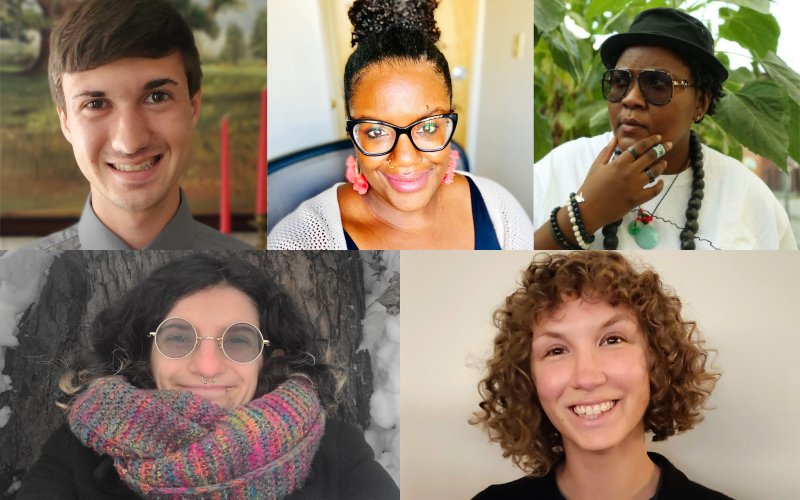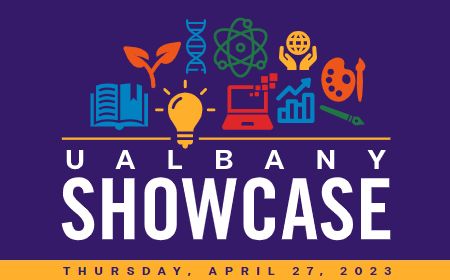Showcase 2023: Sparking Social Justice Dialogue

By Erin Frick
ALBANY, N.Y. (April 4, 2023) — The School of Social Welfare (SSW) will host a series of “interactive exhibits” to spark community conversations around social justice issues as part of UAlbany’s Showcase Day programming on April 27.
SSW students with expertise in these areas will facilitate three guided conversations focusing on: anti-racism/oppression, ageism/ableism and transphobia/gender identity. All are invited to join these conversations, which will be held in the Campus Center Assembly Hall starting at 11:30 a.m. The schedule for the three sessions is as follows:
- Anti-Racism and Critical Self-Reflection, 11:30 a.m.-12:30 p.m.
- The Intersection of Ageism and Ableism, 1:30-2:30 p.m.
- Talking About Transphobia and Cisgenderism, 3-4:00 p.m.
Each guided conversation is slated to last one hour. Participants can join any portion of the program. Brave space guidelines will be established at the beginning of each session to ensure that participants feel comfortable sharing and asking questions.
“As members of the School of Social Welfare, and the lead school for the new undergraduate social justice major currently being developed by a curriculum committee composed of faculty across disciplines, we need to be open and willing to have conversations about social justice issues that are present and pervasive in our society,” said School of Social Welfare Interim Dean Victoria Rizzo. “As part of this work, we need to create brave spaces where discussions about social justice issues, including race, ethnicity, sexual orientation, gender identity, religious affiliation, physical and mental ability and immigration status (to name a few) can happen. Critically — and what we are aiming to do with this program — these conversations must expand beyond the classroom and into the broader community.
“We hope these sessions will bring a deeper understanding of social justice issues to all who participate and instill the importance of making inclusiveness a habit.”
The topics to be explored throughout this program are deeply intersectional. While the program will be presented in three parts, the guiding themes for each conversation will be interwoven throughout.
‘Anti-Racism and Critical Self-Reflections’
Presented by Melody Benedict; co-led by Heather Horton
Melody Benedict is a second-year PhD student in the School of Social Welfare working with associate professor Heather Horton. Benedict is currently the principal investigator of a study exploring how anti-racism, or a lack thereof, manifests in institutional settings. This work centers on frontline clinical social workers and their experiences with antiracist practices being implemented within their respective organizations and agencies.
Together, Benedict and Horton will host a conversation on anti-racism designed to encourage critical self-reflection and sharing of personal experiences, with a focus on human connectedness. Participants will be challenged to consider and acknowledge their own positions of privilege and power, and examine their assumptions around diversity, equity and inclusion. The discussion will explore the ways in which white supremacy's systemic and institutional power is deeply rooted throughout our society. The conversation will also address self-compassion and how honest, empathetic dialogues can facilitate healing.
“In the absence of making antiracist choices, we (un)consciously uphold aspects of white supremacy, white-dominant culture and unequal institutions and society,” said Benedict. “Thus, learning about racism and anti-racism requires thoughtful self-reflection. This showcase session will address unlearning various forms of racism (individual, interpersonal and institutional) by creating a brave space for the conversation. By centering empathy, compassion and humility, a discussion regarding pathways toward healing will be explored and participants will be invited to discover new ways of knowing. Ultimately, we hope this session will spur further conversations that will help create a more inclusive campus climate that promotes safety for BIPOC students who have historically experienced marginalization in academic spaces.”
‘The Intersection of Ageism and Ableism’
Presented by Kyra Nolte and Noah Crane; co-led by Linda Mertz
Master of Social Work students Kyra Nolte and Noah Crane will lead a conversation on ageism and ableism with advisor Linda Mertz, special projects coordinator and continuing education director at SSW. Their discussion will invite participants to confront their own biases around these twin “isms” and recognize the broader structures of oppression that affect older adults. Both students are part of SSW’s “Internships in Aging Project” (IAP).
This year, as part of the field practicum component of the MSW program, Nolte has worked at the Albany Neighborhood Naturally Occurring Retirement Community (NNORC) and LifePath, an organization that offers supportive services for older adults.
“Understanding ageism and its intersection with ableism has been integral this year in both a clinical sense, and in a macro/systemic context,” Nolte said. “From individuals’ beliefs about what aging means for themselves and their peers, to the types of services available and their accessibility, this theme has been a constant all year. Like any of the ‘isms’, we are taught ageism and ableism from very early ages. I believe that as clinicians, we must work to critically confront these biases within ourselves, and within the systems we work in.”
Crane’s field placements have included the Alzheimer’s Association of Northeastern New York and High Peaks Hospice in Glens Falls.
“During this time of serving vulnerable populations, both older adults living with a neurodegenerative disease and hospice-eligible older adults with a terminal diagnosis of six months or less to live, I’ve come to understand just how crucial it is to establish anti-ageism and anti-ableism rhetoric. The folks that we serve have a rich history of stories to share and are an integral component to our society that cannot be ignored. A disease or diagnosis does not define the clients that we serve, and yet our learned biases and conceptions about what aging means has created systemic failures to support these individuals to thrive as they age.
“Our work as geriatric social workers must be focused on creating supportive spaces and opportunities so that older adults, regardless of their cognitive or functional capacity, can live full and meaningful lives.”
‘Talking About Transphobia and Cisgenderism’
Presented by Sadiya "YaYa" Wright and Sophinnian Rich; co-led by Sarah Mountz
Sophinnian Rich is a Master of Social Work student, whose work focuses on LGBTQQIAP+ adolescent mental health and Jewish, BIPOC and migrant empowerment. YaYa Wright is a Master of Social Work student who will be starting SSW’s joint MSW/PhD program in the Fall. They serve as a peer advocate at “In Our Own Voices, Inc.” and work closely with and advocate for the LGBTQIA+ community.
Together with associate professor Sarah Mountz, the team will lead a discussion on the ways transphobia and cisgenderism manifest, how these systems affect all people and what we can do to dismantle these systems and their many pervasive harms.
“Transgender and gender expansive communities are currently facing an unprecedented legislative attack with over 450 pieces of anti-LGBTQ+ legislation introduced so far in 2023, much of it targeting trans people — and trans youth, specifically — and the people who love, affirm and support them,” the team explains. “Trans people deserve to feel safe in the world and in our UAlbany community. We believe there is no better place to start than creating greater consciousness about the experiences, needs and awesomeness of trans and gender-expansive students on our own campus.
“In this conversation, we plan to discuss gender diversity and its extensive global history. We will also explore the history and manifestations of transphobia within society and its relationship to other systems of oppression. We will talk about where justice for trans and gender-expansive people fits into the work for social justice more broadly.
“We hope to emphasize the importance of safety and access in the built environment, in the systems of technology we rely on, in health and mental health care and beyond. We also will discuss the importance of pronoun use (with opportunities to practice), and strategies for gracefully self-correcting and educating others. Finally, we hope to center the voices of trans and gender-expansive students, faculty and staff on campus and encourage strategies those with cisgender privilege can use to be good allies or accomplices.”
UAlbany Showcase Day
Showcase Day will bring together the entire University community to highlight the academic excellence of UAlbany students through their research, scholarship, creative activities and experiential learning.
This day-long event unites UAlbany's existing student showcases and conferences, with students across all disciplines presenting their work.

The showcase will include:
- Poster presentations
- Research talks
- Art exhibitions
- Student performances
Events will be held from 8:30 a.m. to 5 p.m. around the Academic Podium, including the Lecture Center Concourse, the University Art Museum, Performing Arts Center and University Library, as well as in the Campus Center and ETEC.




